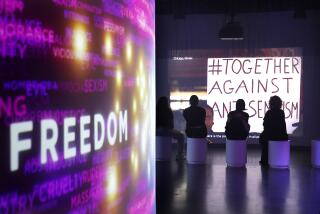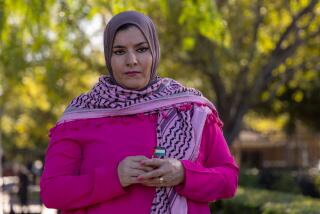Goose bumps at an L.A. mosque
- Share via
FEW FOLKS have strong opinions on Presbyterians. But, since 9/11, you can’t open your car door without hitting someone with a line on Islam. When I pulled into a parking space near a domed sanctuary on Exposition Boulevard, I expected to meet some.
Masjid Omar Ibn Al Khattab was one of 25 local mosques that recently extended a communitywide invitation to visit. It was my second trip to an interfaith open house in a month, and if the downtown Los Angeles mosque lacked the spit-and-polish precision needed to move crowds through the Newport Beach temple of the Church of Jesus Christ of Latter-day Saints, its commitment to rebranding — asserting control of its image and message — was just as robust.
Many sociologists have adopted a market model to explain why some faiths prosper and others fail. In the great American bazaar of religious beliefs, movements that don’t build a “consumer” base go bust. Why are once-thriving Shaker communities now tourist spots? It’s not because Shakers were bad Christians. Rather, the group’s choices had limited appeal. Spirited services are fine and good, but how many people will give up everything to live in a celibate communal society?
In a global village, wired more tightly than even Marshall McLuhan imagined, anyone can know everyone’s business in the time it takes to go online. Scandal, dissension and schism flash across the globe — quickly followed by facts, opinions and, gasp, lies. Rebranding is a way for faith groups to manage their image as well as to build their base in a religiously contested, media-saturated world.
Here in the U.S., some religions, especially those perceived as “different,” have faced deep hostility and struggled for the right to define themselves. In the 19th century, Mormons were persecuted for their beliefs. In the post-9/11 world, Muslims experience discrimination, abrogation of their civil rights and deportation — as did Jews, Catholics and Quakers before them.
And the sins of a few redound on the group as a whole.
Pope Benedict XVI, during his trip to Germany last month, told Muslim leaders that they needed to actively battle “the darkness of a new barbarism.” Although he did not explicitly link Islam with terrorism, the pope seemed to hold the entire community responsible for the extremist activities of a few. (Not that this is unique — the embarrassed believers currently marking time in the shame box are evangelicals busily distancing themselves from Brother Pat Robertson’s remarkable theology of Christian “take-out.”)
At the Omar mosque, visitors entered a large, cool, quiet lobby. There were tours of the sanctuary where the call to prayer was recited in several languages. Downstairs in a basement meeting room, members of the Omar community showed off calligraphy, handicrafts and plans for building expansion.
When the formal program began, Hassan Hathout, a physician, ethicist and founder of the Islamic Center of Southern California, borrowed a page from the pope’s playbook, noting that Muslims bear the “double pain” of living through 9/11 and being accused of perpetrating it.
“Muslims have become the other, the hated people, the terrorists, the criminals, the foreigners,” he told several dozen listeners. “Overnight we felt as the Japanese felt in World War II and before that what Catholics felt and before that what Jews felt.”
What Hathout said next surprised me.
“I used to say, ‘I am a Muslim, he is a Christian, he is Jew,’ ” Hathout said. “Now my Islamic thinking has led me to classify humanity into two categories: those with a loving heart and those with a hating heart.
“This is now my Islamic calling — to transform hating hearts into loving hearts.”
Great rebranding, and a tag line so good it gives me goose bumps. Finding common ground — as long as it doesn’t betray one’s fundamental beliefs — is a strong selling point. In a world where a distressing number of people use religion as an excuse to defame, degrade, marginalize and even kill, Hathout’s bottom-line theology is very compelling.
“All you need is love,” sang the Beatles, a brand John Lennon claimed was bigger than Jesus.
Then again, wasn’t that Jesus’ tag line too?
More to Read
Sign up for Essential California
The most important California stories and recommendations in your inbox every morning.
You may occasionally receive promotional content from the Los Angeles Times.










